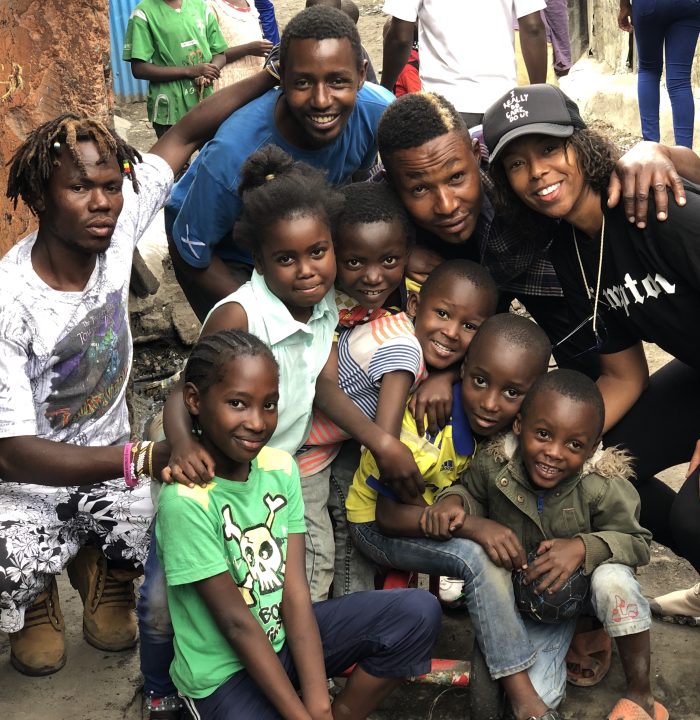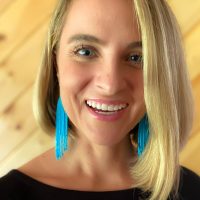Along his spiritual journey, Ram Dass once asked his teacher Neem Karoli Baba, “Maharaji, how can I know God?” His response: “Feed people.”
Confused by the simplicity of his teacher’s guidance, Ram Dass requested clarification: “That was such a weird answer that I assumed the translator screwed up, so I figured I’d rephrase it: ‘Maharaji, how can I get enlightened?’” His response: “Serve people.”
This story from Ram Dass reflects, in many ways, how our society has come to understand Seva, or selfless service: Feed. Serve. Love. While these universal teachings are not outdated, yoga teacher and researcher Dr. Angela Pashayan takes them one step further: Instead of simply feeding people, Angela helps create pathways for people to feed themselves–and their communities. Instead of serving people without context of their situation, Angela works alongside community members to fully understand what they need before responding.
“Experts often think they know what people in poverty need without actually asking the people they’re serving,” the Howard University researcher says. “Someone might look hungry so you go feed them, when in actuality they could feed themselves if they didn’t have to spend so much money on something like school fees. By listening, engaging in dialogue, and thinking critically, we can ascertain what people really need.”
Angela founded the nonprofit, Yoga of Devotion (YOD) International, in 2006. Through a dynamic, data-driven approach, YOD International helps reduce extreme poverty through agriculture, art, and entrepreneurship. The organization has supported and developed poverty reduction programs across the globe, including in India, Nepal, Indonesia, Peru, and Tanzania.
In 2012, while traveling in East Africa, Angela visited the slums of Nairobi, Kenya. Upon seeing the levels of extreme poverty there, she “could not turn away” from continual involvement. From then on, YOD began on-the-ground efforts to reduce poverty in Mukuru, Nairobi’s second largest slum and home to approximately 825,000 residents. Tens of thousands of Kenyans have since benefited from entrepreneurship, art empowerment, women’s programs, financial training, micro-farming, and food security programs.
“The work of YOD exemplifies taking yoga into the world and sharing its principles: wellbeing, peace, and empowerment,” Angela explains. “Yoga is not limited to physical exercise. Yoga is a way of life.”
That way of life includes not only witnessing, but also seeking to understand the suffering and experiences of others–the impetus behind Angela’s entry to yoga. Angela served for several years as a caregiver to her mother who was dying of congenital heart failure. Angela was pregnant with her third child at the time. Three weeks after her mother passed, Angela gave birth to a healthy son. Yet due to the stress she was experiencing, she developed dangerously high blood pressure. Her prescribed treatment was simple, yet effective: “My doctor recommended yoga and meditation, plus a simple water pill to reduce the strain on my heart. It worked!” And, as Angela puts it, her life was transformed.
From attending Yoga Journal conferences in San Francisco, to studying with teachers such as Rodney Yee, David Life, and Tias Little, she began to deepen her understanding of yoga, ultimately finding surrender and peace through her unique practice called Bhakti Asana, or the Yoga of Devotion, a combination of postures with specific self-reflective meanings behind them.
Bhakti Asana served as a lifeline for Angela, particularly upon receiving a breast cancer diagnosis two years after her mother died. “My Yoga of Devotion home practice became invaluable,” she explains. “It was at that time I decided to take this practice into the world.”
YOD International became a springboard to empower Angela’s local and global communities. She built a network of yoga practitioners in various places, such as San Francisco, Los Angeles, Australia, and Dubai. Most of those practitioners still support YOD International, and many have joined Angela on trips abroad to experience what it means to “live yoga off the mat.”
“The Yoga of Devotion practice reflects not only a devotion to your higher self, but to giving back, especially to those in extreme poverty,” she says. It is also a way to empower the marginalized due to their racial or social identities. “I’m a Black woman from Compton, California,” Angela notes. “I have experienced some of the same socio-economic issues, but at different levels of extremity. It helps me understand the people I serve, and it anchors my Seva practice.”
Angela hopes her work will inspire yoga practitioners of all backgrounds and experiences. “I don’t look like the yogis typically featured on the cover of yoga magazines,” Angela says. “When people don’t see a yogi who looks like them, they have no example to follow. Representation matters, and there is a responsibility to open the door and provide a path for others to follow.”
To follow Angela’s path, or learn more about YOD International’s transformational work, visit www.YODInternational.org.



Read 0 comments and reply